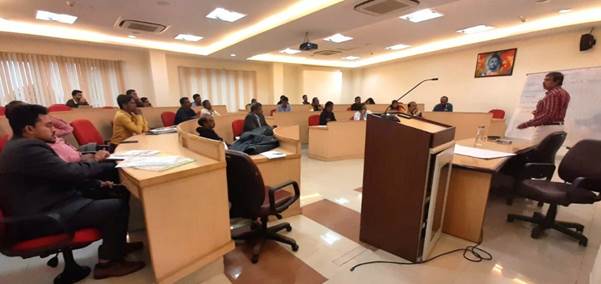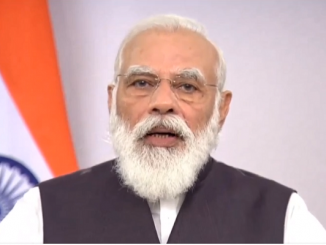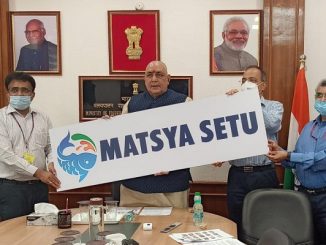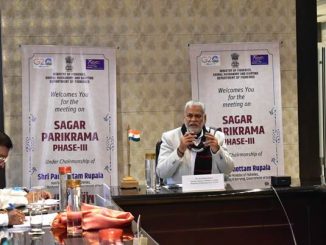
Jan 13: The Department of Fisheries initiated a two-day Annual Plan Preparation Workshop from January 4–5, 2023, to brainstorm, share information, and resolve on-ground challenges through effective and efficient planning by fisheries officials of all states and UTs. The workshop was chaired by Shri Jatindra Nath Swain, Secretary, DoF (GoI), in the presence of senior officials of the Department of Fisheries (GoI), NFDB, and state fisheries departments. A total of 47 officials from 26 States/UTs attended the workshop and made it a grand success.
The workshop started with the inaugural session, in which JS (IF), and DoF, welcomed all dignitaries and participants. He summarised the achievements of ongoing departmental schemes such as Pradhan Mantri Matsya Sampada Yojana (PMMSY), Fisheries Infrastructure Development Fund (FIDF), and Kisan Credit Card (KCC). He indicated that there are tremendous efforts by states and UTs to increase fish production, while gaps exist in giving importance to other aspects of the fisheries value chain at the state level. The necessary corrective actions will be taken by reviewing and replanning the upcoming state and UT annual plans.
In his address, the Joint Secretary (MF) stressed the formalization of the fisheries sector, enhancing domestic fish consumption, the introduction of performance-based incentives for value chain efficiencies and quality assurance, shifting from fresh to frozen fish, branding, digital marketing, precision aquaculture, aquaculture insurance, entrepreneurship mentoring, co-management models, low-cost modern fishing vessels, vessel monitoring systems, and energy-efficient fishing boats.
In her address, the Chief Executive of the NFDB highlighted the progress and achievements of the sub-activities of PMMSY and the gaps in the physical progress in the states and UTs, and also highlighted the development of coastal fisher communities, training and capacity building, cluster development, FFPOs, convergence, river ranching, aqua parks, etc.
The Secretary of the Department of Foreign Affairs (GoI) expressed his views on ongoing activities and urged states and UTs to set local priorities in addition to the Government of India’s priorities in his inaugural speech. He advised that special attention may be given to sufficient seed production—the most basic activity to propel the sectoral activities—and that a collaborative approach amongst states and centres be taken for activities such as the installation of artificial reefs, cold-chain management, MIS data management, expansion of fish markets (the Fish Bazaar), promotion and marketing of frozen fish, production of the required number of seeds, etc. The priority areas mentioned along with the strategic rationale are likely to serve as guidelines for state and UT officials in setting priorities for chalking out the FY 2023–25 detailed annual action plan. In addition, he stressed that each state and UT should evaluate their resources and current situations to formulate their detailed annual action plans.
Post the inaugural session, the states and UTs presented their physical and financial achievements in FY 2020–21 and FY 2021–22, highlighted on-the-ground challenges faced, and provided an overview of the annual plans for the upcoming years 2023–24 and 2024–25. The interactive session led to interstate discussions, the exchange of good problem-solving practices, and guidance from the leadership. In the last leg of day one, the session concluded with a summary and a setting of the context for the next day.
On the second day of the workshop, group activities were done in three different groups, followed by a presentation by the group leader. The group discussion entailed a cross-pollination of thoughts, and innovative ideas to resolve on-ground challenges and issues.
The workshop focused on the formulation of strategies with the states and UTs for the Annual Action Plans (2023–24 and 2024–25). It also served as an opportunity for peer learning and interaction (amongst states and UTs facing similar challenges). During the event, presentations and discussions on Management Information Systems (MIS), Direct Benefit Transfer (DBT), and Single Nodal Accounts (SNA) were also organised to share process overviews and address queries.
The event successfully concluded with an address by the Joint Secretary (MF), wherein he summarised the key takeaways from the sessions and revisited the focus areas and important decisions. The workshop thus concluded with high fervour to plan and work effectively and efficiently for the overall growth and development of the fisheries and aquaculture sectors.
Background:
The flagship scheme of Pradhan Mantri Matsya Sampada Yojana (PMMSY) was launched in September 2020 for a period of FY 2020–25 with the highest ever sectoral investment of Rs 20050 crore. The Department of Fisheries (GoI) has been endowed with a huge responsibility of bringing in structural changes and sectoral reforms and has been tirelessly putting efforts in mobilising, guiding, and supporting States/UTs for sanctioning strategic projects that will pave way for achievements of the PMMSY targets and objectives.
Under PMMSY, a total investment of Rs 11,318.00 crore (FY 2020–23 to date) has been made in various projects across all states and UTs. It was observed that both the Center and the States/UTs could meet on a common platform to discuss ongoing challenges and issues for gap analysis, as well as corrective measures to achieve scheme objectives and overall fisheries sector growth.
Disclaimer: We donot claim that the images used as part of the news published are always owned by us. From time to time, we use images sourced as part of news or any related images or representations. Kindly take a look at our image usage policy on how we select the image that are used as part of the news.


